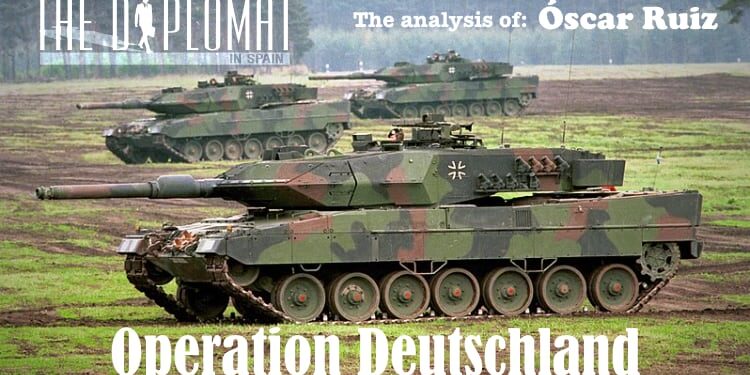SUMMARY
Operation Deutschland’ is a 1,000-page document detailing the measures the German government would take to protect critical infrastructure and mobilize its own troops, as well as assist in the mobilization of NATO troops, should Europe face a potential conflict.
Óscar Ruiz / Escudo Digital
After witnessing the war contingency plans for the populations of Sweden and Finland, it is Germany’s turn; Operation Deutschland is a strategic plan developed by Berlin to prepare the country for the possibility of a large-scale conflict in Europe, especially in the context of potential Russian aggression. The document details specific measures to protect critical infrastructure and coordinate the mobilization of military and civilian resources in the event of an escalation of war.
The development of this plan is clearly in response to growing tensions between Russia and the West, especially now that with peace negotiations between Trump and Putin on the horizon, the two fronts are pushing (militarily speaking) for the best possible cards at the negotiating table. The recent modification of Russian nuclear doctrine, which now allows the use of nuclear weapons in response to conventional attacks, has only increased concern in Europe.
More recently, Moscow’s use of ballistic missiles for the first time in the conflict in response to Kiev’s use of NATO long-range missiles (ATACMS and Storm Shadow) has only multiplied the tension and fear of the situation getting out of hand for the Kremlin.
Operation Deutschland is a document detailing how the country would organize itself in the event of a major war. In this report Germany describes how it could help mobilize up to 800,000 NATO troops, including Americans, to Ukraine if the situation with Russia escalates. It is a preemptive measure in the face of a possible major conflict, such as a World War III.
The plan is more than 1,000 pages long and touches on several key points:
Protect the essentials
It identifies important buildings and infrastructure, such as hospitals, communication centers or warehouses, that must be safeguarded to remain operational in the event of a crisis.
Moving military assets
Germany plans how to allow up to 200,000 military vehicles to pass through its territory, ensuring that troops and equipment get to where they are needed quickly.
Preparing people and businesses
There are also tips for citizens to become more self-sufficient. For example, it is recommended to install diesel power generators or even small wind turbines at home to ensure they have electricity in case of an emergency.
Beyond troop movements and military vehicles, this plan also addresses the importance of being prepared. Germany is not only thinking about its armed forces, but also about how to ensure that the daily lives of its inhabitants can continue to function, even in a crisis.
Critical point in the international situation
Such planning does not mean that war is inevitable, but it does mean that governments are taking the risks seriously and want to be ready to protect their people and allies if things go wrong. This proactive approach may seem alarming, but it is basically insurance against the unexpected.
Recent preparedness measures in Europe for a possible war conflict coincide with repeated warnings from incoming U.S. President-elect Donald Trump about the possibility of a global conflict. On several occasions, Trump has pointed out that the international situation is at a critical point, with three key players – Russia, North Korea and Iran – actively engaging in confrontations affecting U.S. allies.
Although Trump has not yet presented a clear plan to address the war in Ukraine, his stance raises concerns in some sectors of NATO and among analysts who fear a possible rapprochement towards Moscow.
Europe is preparing for a war, which, although most probably will not happen, is worrying because an “accident” or a “miscalculation” in this show of force by the two sides that we are witnessing in the Ukrainian war could start an unstoppable escalation that could end with the use of a nuclear weapon by Russia.
 ÓSCAR RUIZ
ÓSCAR RUIZ
Migration expert and international analyst
Career Marine Infantryman with more than 30 years of experience. Nine years assigned to NATO Headquarters in Belgium and Sarajevo developing intelligence and information security functions.
Military missions in Africa, America and Europe. Lecturer and speaker on subjects such as jihadist terrorism, migration challenges and maritime security.







